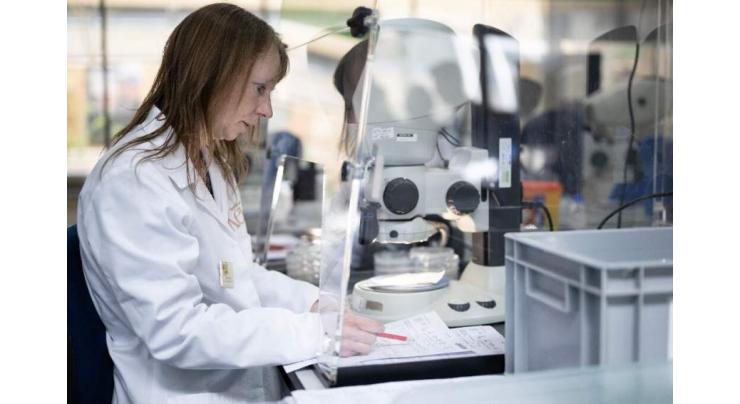
The Noah's Ark For Plants Beneath The English Countryside
Sumaira FH Published May 19, 2023 | 07:01 PM

Inside bomb-proof frozen vaults underneath the English countryside hides a treasure trove of 40,000 species of wild plant seeds from around the world, many of which are in danger of disappearing
Ardingly, United Kingdom, (UrduPoint / Pakistan Point News - 19th May, 2023 ):Inside bomb-proof frozen vaults underneath the English countryside hides a treasure trove of 40,000 species of wild plant seeds from around the world, many of which are in danger of disappearing.
The world's largest seed bank, located in the sleepy countryside south of London, is in a race against time because two out of five plant species are threatened with extinction, according to scientists.
Britain's David Attenborough, a leading environmental figure of international renown, has called the Millennium Seed Bank (MSB) "perhaps the most significant conservation initiative ever".
"The purpose is conservation of wild species through seeds, against those species becoming extinct, in the long run," explained John Dickie, the project's senior research leader.
The 70-year-old has been involved with the MSB since its inception in the late 1990s and the opening of its current home in 2000 to celebrate the millennium.
A total of 2.5 billion seeds are stored at the MSB in Wakehurst, 35 miles (56 kilometres) outside London, and at a branch of the capital's Kew Gardens botanical gardens.
They come in all shapes, colours and sizes, and belong to 40,020 different species originating from 190 countries.
Nearly 20 percent of the world's flora is preserved at Wakehurst, with priority given to plants that are threatened, particularly by climate change, and endemic plants that can only be found in one geographical area.
Plants that have a societal function, such as for medical or economic use, also have their place.
"Plant species are endangered for several reasons but mainly through land use change, and increasingly through climate change," said Dickie.
"Some plants will adapt. Others are not adaptable. At least they are here rather than not existing anymore," he added.
Wakehurst receives new seeds from all over the world every week and then the process of saving them begins.
That process is "based on the technology that has already been in use for crop species", said Dickie.
"It's not rocket science. Dry it, freeze it. It's just chemistry," he added, explaining that, once frozen, the seeds can be stored for decades, probably centuries.
Dickie's team of around 20 researchers and various volunteers works in public view in their glass-fronted laboratory.
Lucy Taylor is working on Albizia Polyphylla seeds that have arrived from Madagascar.
"Madagascar is a very interesting place for us. As it was disconnected from Africa, there's a unique flora. And there's also a lot of pressure on land," she said.
One of her jobs is to separate the empty seeds from the rest.
Related Topics
Recent Stories

Currency Rate In Pakistan - Dollar, Euro, Pound, Riyal Rates On 25 April 2024

Today Gold Rate in Pakistan 25 April 2024

Mired in crisis, Boeing reports another loss

Session Awarding Ceremony 2024 held at Cadet College Muzaffarabad

Austrian ski great Hirscher to make comeback under Dutch flag

Pakistan, Japan agrees to convene 'Economic Policy Dialogue'

FM Dar conveys deepest sympathy on torrential rains devastation in UAE

Spain PM Sanchez says weighing resignation after wife's graft probe

Tennis: ATP/WTA Madrid Open results - 1st update

Long-lost Klimt portrait auctioned off for 30 mn euros

Osaka seals first win on clay since 2022 in Madrid

Earthquake jolts Karachi
More Stories From Business
-

Currency Rate In Pakistan - Dollar, Euro, Pound, Riyal Rates On 25 April 2024
1 hour ago -

Today Gold Rate in Pakistan 25 April 2024
2 hours ago -
Meta profits soar but costs of AI cause worry
2 hours ago -

Mired in crisis, Boeing reports another loss
11 hours ago -

Pakistan, Japan agrees to convene 'Economic Policy Dialogue'
11 hours ago -

British-Pakistani firm unveils $35 million luxury apartments for overseas Pakistanis in Islamabad
11 hours ago
-

European stocks lose momentum after global rally
12 hours ago -

New pulses varieties imperative to cater domestic food requirements: Dr Khalid Hasan
13 hours ago -

CEO KP-EZDMC meets CRBC officials
13 hours ago -

Pakistan among nine poor countries that produces 90 percent cigarettes for world
13 hours ago -

Chief Minister Gilgit Baltistan Haji Gulbar Khan calls on Minister for Privatisation
14 hours ago -

Germany nudges up growth forecast, ailing economy at 'turning point'
14 hours ago
















